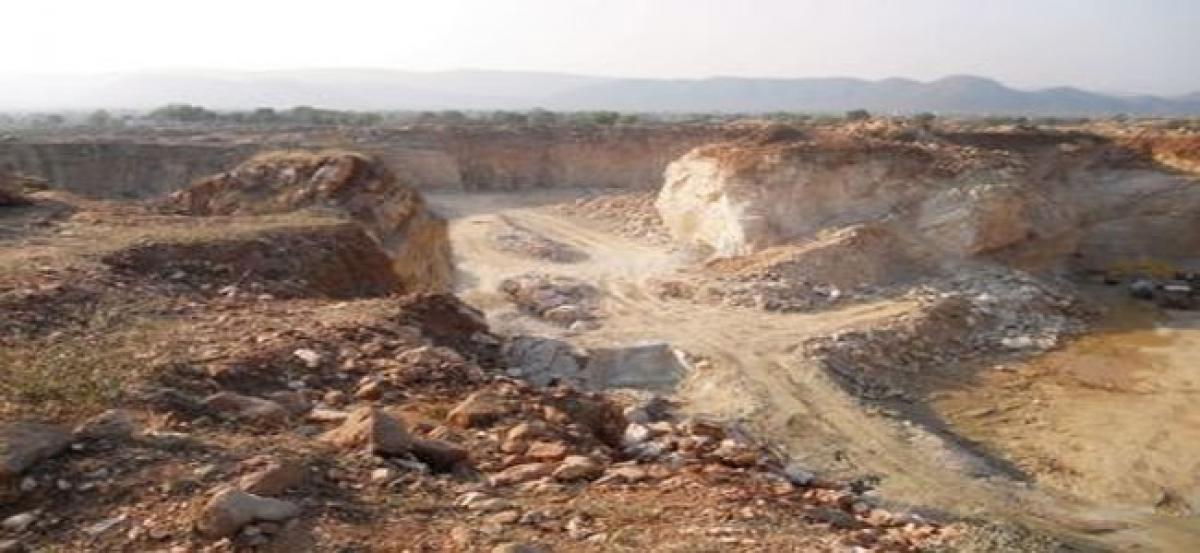Live
- GMR Airports Unveils AI-Powered Digital Twin Platform to Transform Airport Operations
- India poised to become leading maritime player: PM Modi
- Top Causes of Kidney Stones and How to Recognize Silent Symptoms
- India’s renewable energy capacity logs 14.2 pc growth at 213.7 GW
- Winter Session of Odisha Assembly adjourned sine die
- Biden calls Trump's tariff approach 'major mistake'
- After Drama Over Eknath Shinde’s Chief Minister Race, Maharashtra Cabinet Formation Faces New Tensions
- Egyptian FM, Blinken discuss recent developments in Syria
- Iran's supreme leader says Syria's developments result of US-Israeli 'plot'
- Elon Musk to Purchase $100 Million Luxury Mansion Next to Donald Trump's Mar-a-Lago, Report Reveals
Just In

A whopping 98.87 lakh metric tonnes of minerals were illegally excavated in a period of five years in five Rajasthan districts, says a latest Comptroller and Auditor General (CAG) report, which highlights rampant unlawful mining and gross violations in the desert state, including flouting of Supreme Court orders pertaining to the Aravali hills.
JAIPUR: A whopping 98.87 lakh metric tonnes of minerals were illegally excavated in a period of five years in five Rajasthan districts, says a latest Comptroller and Auditor General (CAG) report, which highlights rampant unlawful mining and gross violations in the desert state, including flouting of Supreme Court orders pertaining to the Aravali hills.
HIGHLIGHTS
- The report claims that apex court directions regarding Aravali hills were not followed
- Rajasthan has a rich reserve of copper, lead, zinc, rock phosphate, soapstone, silica sand, limestone, marble and gypsum
- Mining without a licence, mining outside lease area, raising of minerals without paying royalty are illegal mining activities
The CAG report, tabled in the state Assembly yesterday, claims that apex court directions regarding Aravali hills were not followed by the state's department of mines as mining leases falling within the mountain range area were granted and renewed. Even the Union ministry of environment and forests granted clearance for mining leases despite the area falling under the Aravali hill range, it adds.
"We noticed serious violations of the orders of the Supreme Court of India as mining leases falling in Aravali mountain range were granted, renewed and extended. Besides, the MoEF also granted environmental clearances for mining lease despite the area falling in Aravali hills," the auditor said.
Rajasthan has a rich reserve of copper, lead, zinc, rock phosphate, soapstone, silica sand, limestone, marble and gypsum, and most of these minerals are found in the Aravali mountain range.
The audit also castigated authorities claiming there was inadequate follow up of illegal mining cases, lack of deterrence due to delay in issuing of notices and non-implementation of policy measures.
According to the report, a scrutiny of the records of nine superintending mining engineers (SME) or mining engineers (ME) in five districts - Alwar, Jaipur, Sikar, Rajsamand and Udaipur - revealed that these offices registered 4,072 cases of illegal mining, transportation and storage of mineral during 2011-12 to 2016-17.
The Rajasthan mineral policy, 2011, stipulated certain measures for curbing illegal mining in the state but perusal of records of selected offices disclosed that no concrete measures like regulatory supervisions, proper vigilance, non-initiation of incentives schemes, modernisation of check posts and restoration and reclamation of mined out pits were taken, the CAG observed.
Another finding of the audit was that the state government had levied an environment and health cess in 2008 on selected major mineral proceeds which was to be utilised for the protection of environment and health and maintenance of ecological balance, especially in the mining areas.But the funds were sanctioned for activities which did not meet the objectives the cess was actually collected for, the CAG report said.
Mining without a licence, mining outside lease area, raising of minerals without paying royalty are illegal mining activities which not only put immense pressure on environment as they do not comply with any regulations or environmental conditions but they also have serious consequences on natural resources like forests, rivers, flora and fauna and public health, the report said.
"Around 98.87 lakh metric tonnes of minerals were found to have been illegally excavated (during 2011-12 to 2016-17). The department, however, could recover only Rs 25.57 crore against the recoverable amount of Rs 204.50 crore," the CAG report on the economic sector for the financial year ended March 31, 2017 said.

© 2024 Hyderabad Media House Limited/The Hans India. All rights reserved. Powered by hocalwire.com







